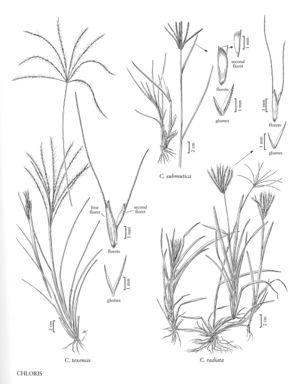Difference between revisions of "Chloris texensis"
FNA>Volume Importer |
imported>Volume Importer |
||
| Line 4: | Line 4: | ||
|publications= | |publications= | ||
|common_names=Texas windmill-grass | |common_names=Texas windmill-grass | ||
| + | |special_status={{Treatment/ID/Special_status | ||
| + | |code=E | ||
| + | |label=Endemic | ||
| + | }} | ||
|basionyms= | |basionyms= | ||
|synonyms= | |synonyms= | ||
| Line 38: | Line 42: | ||
|publication title= | |publication title= | ||
|publication year= | |publication year= | ||
| − | |special status= | + | |special status=Endemic |
| − | |source xml=https:// | + | |source xml=https://bibilujan@bitbucket.org/aafc-mbb/fna-data-curation.git/src/bb6b7e3a7de7d3b7888a1ad48c7fd8f5c722d8d6/coarse_grained_fna_xml/V25/V25_809.xml |
|subfamily=Poaceae subfam. Chloridoideae | |subfamily=Poaceae subfam. Chloridoideae | ||
|tribe=Poaceae tribe Cynodonteae | |tribe=Poaceae tribe Cynodonteae | ||
Revision as of 22:05, 27 May 2020
Plants perennial; cespitose. Culms 30-45 cm. Sheaths glabrous or sparsely pilose; ligules membranous, not or only shortly ciliate; blades to 15 cm long, about 4 mm wide, scabrous. Panicles with 8-10 clearly separate branches, these usually digitate, occasionally a poorly-developed second whorl present just below the terminal whorl; branches to 20 cm, divergent, basal 2-5 cm without spikelets, averaging 3-4 spikelets per cm elsewhere. Spikelets with 1 bisexual and 1 sterile floret. Lower glumes 2.7-3 mm; upper glumes 3.5-3.8 mm; lowest lemmas 3.7-4.3 mm long, 0.7-0.8 mm wide, lanceolate to narrowly ovate, sides not conspicuously grooved, margins glabrous or sparsely appressed pubescent distally with hairs shorter than 1 mm, apices acute, awned, awns 7-11 mm; second florets 2-2.5 mm long, about 0.5 mm wide, narrowly elliptic, acute, inconspicuously bilobed, awns 4.5-6.5 mm. Caryopses about 2.3 mm long, about 0.5 mm wide, ellipsoid, trigonous. 2n = unknown.
Discussion
Chloris texensis appears to be rare. It is endemic to Texas.
Selected References
None.
